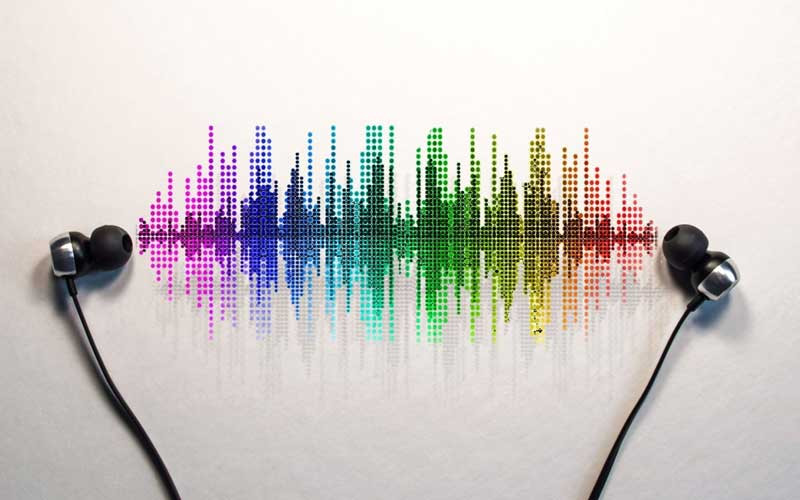
As cool as a cucumber, I will respond to the above question with an absolute
“Yes”.
From my experience, many years ago, when I was studying for my ‘O’ Level Mathematics, I would lock myself into my room and turn on the radio very loud.
My father would find this annoying and would always ask: “What kind of studying is that? Don’t you find the radio disturbing you?” I would often reply that “As a matter of fact, I find the music on the radio motivating me”. Indeed it made me concentrate more.
My father would always add: “That is strange! How can you concentrate on anything with that noise in the background?” The rest of my family thought that I was weird. They all thought that loud music was the straw that broke the camel’s back, but to me, it wasn’t.
To my family’s surprise and pride, after examinations, I came out with an A grade in Mathematics. From then onwards, my whole family would let me study with the radio on.
To this day, I read books on serious subjects with the radio on.
I spent several years studying human psychology but up to now I am still not sure what it is that triggers the mind to listen to music while concentrating on something else at the same time. Suggestions on the brain releasing a substance known as dopamine have been made to justify this phenomenon.
- TIME RUNNING OUT FOR NDIRAYA
- ‘One stop centre for IDs, voter registration blitz’
- Family members rejoiced when Tuku, Sam died: Daisy
- Ndiraya boost amid DeMbare crisis
Keep Reading
Apart from helping me in my studies, I consider music to be a strong cultural force. It speaks the minds of young people. Good examples of what today’s youngsters’ music preferences are rap/hip hop, Zimdancehall and pop music. I know several of them who use these different music genres to enhance their studying prowess.
If you have ever felt your mood shift while listening to your favourite song, you’re not imagining it. I have read a lot of research which shows that music’s power to boost your mood, motivate you, help you relax, connect you with others and help you to focus,is a real thing!
Today there are so many different genres and styles of music, but we all listen to at least one. We listen to music to cure boredom, have fun with friends and strangest of all, to motivate ourselves.
Normally you would not give it a second thought when you turn your music on low to study. It’s normal for us; but why do we do it?
When I was in college, studying Psychology, I researched the effects of music on the brain and found that the brain releases dopamine when listening to music.
Dopamine is one of the feel good hormones. This hormone works specifically for goal-oriented behaviours.
Music also stimulates the section of your brain that controls motivation. This stimulation could cause you to work harder and faster than without music.
Music has such a huge effect on the brain that it has even been banned from some professional sports. Athletes such as runners cannot use their favourite tunes during a race because music has been known to help runners create a faster pace.
A sports psychologist Costas Karageorghis has even called music a sport enhancing drug. He says that, “music distracts people from exhaustion and pain, increases endurance, boosts mood and even increases metabolic efficiency.”
Perhaps this is one of the reasons the Olympics do not allow music playing during certain sports competitions.
Though each of these consequences of listening to music during exercise are positive, they could give athletes an unfair advantage during competition. That is why professional sports like track and field have banned athletes from music listening during events.
Other sports such as gymnastics actually use music for their events.
The music helps performers to remember their steps, while also motivating crowds.
Dancers will tell you that music definitely makes them have more fun. This is not a coincidence or even the fact that they enjoy the music; it is because the music once again, triggers a dopamine release, making any activity more enjoyable. It also makes the performance more enjoyable to a crowd.
The motivation from music is powerful. That is why it has become such a huge part of our daily routines. We use it when we clean, cook, dance, exercise and even study. Who knew something so normalised as entertainment is actually one of our most positive influencers?
If you’re having a bad day, try putting on one of your favourite songs and focusing on how it makes you feel. One study found that people who listened regularly to upbeat music could improve their mood and boost their happiness within just two weeks.
In the 1980’s, one upbeat song by Oliver Mtukudzi titled Nhamo Dzandimomtera, as depressing as it sounds, uplifted the spirits of many downtrodden and poor people.
I tried to find out what it is in that song that triggers the mood change in people. I thought that if people feel hopeless and helpless, the song uplifts them because they feel that they are not alone in that hopelessness. Others said that the song was meant for them and was playing out how they felt. Whatever it is, the song did have power to boost the mood-change in those people.
What my family didn’t know about my study habits is the fact that music was helping to motivate me to deeper concentration.
They saw it as a hindrance to my studies. My mother would often say that I should use music to do exercises only because she had seen other people at the gymnasium use music in that way.
If you’re struggling to get started on something, music can help motivate you. Up-tempo, fast-paced music can get your brain and body moving. Research shows that listening to certain types of music can inspire you to work longer or harder during your exercise routine.
It’s not just upbeat music that can really help us. Soft, background music can calm the mind and help reduce feelings of stress. You could try listening to classical or instrumental music in the morning to help you wake up while keeping you calm and focused.
Classical music can help you to focus on the task at hand, whether that’s studying or doing something creative.
Play it softly in the background while you go about your tasks and it will increase your brain-processing powers. Classical music such as music by Mozart, Haydin or Beethoven, if you have that kind of collection, will help you in this area.
Or, if you do not have that kind of music, put on your favourite pop song and dance around the room for some extra energy.
Music can feel like an empathetic friend who knows exactly what you’re going through. Choose a song with lyrics that relate to what you’re experiencing, and focus on what you’re listening to.
For instance, when Paul Matavire sang the song Ma U it came out at the same time O’ Level results were released in 1988 and many school children throughout the country had obtained U’ grades around that time.
Many of these students related to this song. The students who had obtained U grades at O’ level would often tease each other on the streets singing this song.
One can also connect with people through music, by sharing playlists, chatting about music online or meeting people at gigs and concerts.
Listening to music and songs that have a positive message when times get tough, can be uplifting as they describe how one is feeling.
But music does more than just give you swagger—it can improve focus, raise morale and generally make you feel happier. It's actually been proven by science.
In one study, researchers played different styles of music while they asked people to identify various emoji faces as happy or sad. However, according to many psychologists, music will help you to ignore the sadness in your life.
This is probably the reason why Tuku’s song Nhamo Dzandimomotera helped to uplift the spirits of many a people.
Music will help you build a positive self-image.
As the saying by Robert Schuller goes: “Tough times never last, but tough people do!”
Robert Schuller shows you how to build a positive self-image, no matter what your problem. Whether it's unemployment, poor health, loneliness, fear or anything else that blocks your success, you can turn your negative into a positive.
No matter how tough times get, you have the potential to achieve the best of life with the help of positive music. With music, faith can move mountains.
Feedback: [email protected]











